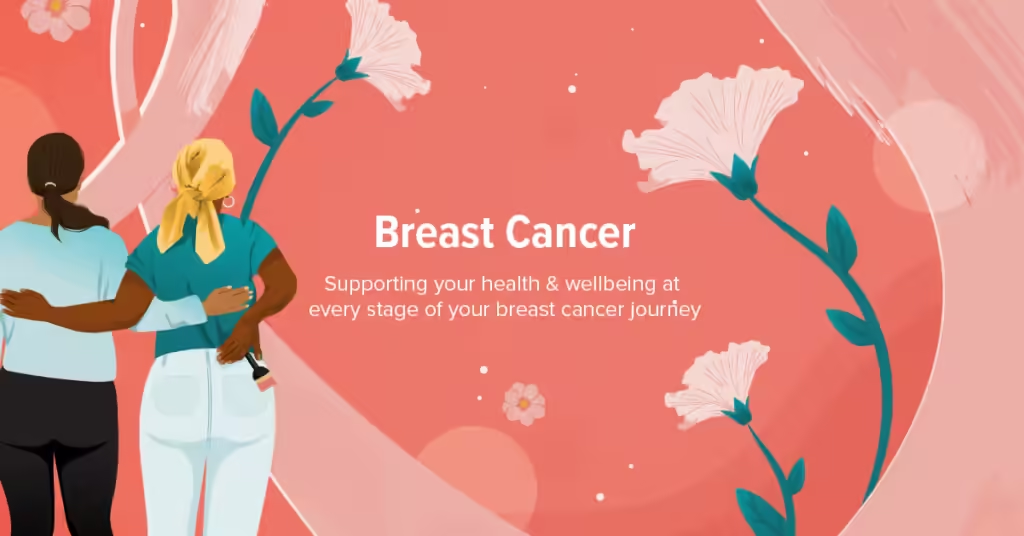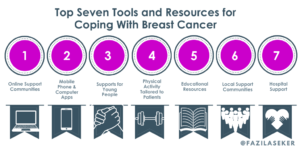BREAST CANCER SUPPORT AND RESOURCES: A COMPREHENSIVE GUIDE.

Breast cancer is a significant health concern affecting millions of individuals worldwide. Receiving a breast cancer diagnosis can be overwhelming, not only due to the medical aspects but also due to the emotional and psychological challenges it brings. Fortunately, there are numerous support systems and resources available to help patients and their families navigate this difficult journey. This guide provides an overview of essential support options and resources for those affected by breast cancer, ensuring you are well-informed and equipped to seek the help you need.
UNDERSTANDING BREAST CANCER
Breast cancer begins when cells in the breast start to grow uncontrollably, forming a tumor. It can occur in both men and women, though it is significantly more common in women. The disease can vary in its aggressiveness and stage, which affects treatment options and outcomes.
BREAST CANCER EMOTIONAL AND PSCHOLOGICAL SUPPORT.
The emotional impact of a breast cancer diagnosis can be profound. It is crucial to seek support to help cope with the psychological effects of the disease.
Counselling Services
1. Professional Counselling: Psychologists and counsellors specializing in oncology can provide valuable support. They offer a safe space to discuss fears, anxieties, and emotional struggles. Therapy can help individuals and families process their feelings and develop coping strategies.
2. Support Groups: Joining a support group can be incredibly beneficial. These groups offer a community of people who understand what you’re going through, providing both emotional support and practical advice. Support groups can be found in person at hospitals or community centres, and online for those who prefer remote options.
FINANCIAL ASSISTANCE AND RESOURCES FOR BREAST CANCER PATIENTS.

The financial burden of the treatment can be significant. Fortunately, various resources can help alleviate some of these costs.
Insurance Assistance
1. Health Insurance: Ensure that you understand your health insurance coverage. Many insurance plans cover breast cancer treatment, but understanding your policy details can prevent unexpected costs. Contact your insurance provider for detailed information about coverage and any financial assistance programs they may offer.
2. Financial Counselling: Some hospitals and cancer centres provide financial counselling services. These professionals can help you navigate insurance claims, explore financial aid options, and manage out-of-pocket expenses.
Grants and Assistance Programs
1. Non-Profit Organizations: Various non-profit organizations offer financial assistance for medical bills, transportation, and other expenses related to breast cancer treatment. For instance, organizations like the American Cancer Society and the Susan G. Komen Foundation offer grants and support programs.
2. Patient Assistance Programs: Many pharmaceutical companies have patient assistance programs to help cover the cost of medications. These programs are designed to provide medications at a reduced cost or for free to eligible patients.
PRACTICAL SUPPORT FOR BREAST CANCER PATIENTS

Navigating daily life while undergoing this dangerous cancer treatment can be challenging. Practical support can ease this burden and improve your quality of life.
Home Care Services
1. In-Home Care: Many patients benefit from in-home care services, including help with daily activities, personal care, and household chores. These services can be arranged through local agencies and can provide significant relief during treatment.
2. Meal Delivery Services: During treatment, maintaining a nutritious diet is important, but cooking can be challenging. Meal delivery services, such as Meals on Wheels, can provide healthy meals right to your door.
Transportation and Travel
1. Transportation Services: For those undergoing regular treatment, transportation can become a concern. Non-profit organizations and local cancer support groups often offer transportation services to and from treatment appointments.
2. Travel Assistance: If treatment requires travel, some organizations provide travel grants or assistance with lodging. This support can help reduce the stress of managing travel logistics during a challenging time.
EDUCATIONAL RESOURCES FOR BREAST CANCER PATIENTS

Understanding this cancer and its treatment options is essential for making informed decisions. Numerous educational resources are available to help patients and their families gain the knowledge they need.
Educational Materials
1. Online Resources: Websites such as the National Cancer Institute and the American Cancer Society offer comprehensive information about breast cancer, including treatment options, side effects, and research updates.
2. Books and Pamphlets: Many organizations publish books and pamphlets that provide detailed information about breast cancer. These materials can be helpful for learning about the disease, treatment options, and coping strategies.
Workshops and Seminars
1. Community Workshops: Hospitals and cancer centres often host workshops and seminars for patients and caregivers. These events can provide valuable information and offer a chance to ask questions to healthcare professionals.
2. Online Webinars: For those unable to attend in-person events, many organizations offer online webinars covering various aspects of breast cancer care, including the latest research and treatment advancements.
SUPPORT FOR BREAST CANCER CAREGIVERS

Caregivers play a crucial role in supporting individuals with the above said cancer. They, too, need support and resources to manage their own well-being while providing care.
Caregiver Support Groups
1. Support Groups: Similar to patient support groups, caregiver support groups provide a space for caregivers to share experiences, receive advice, and find emotional support. These groups can help caregivers feel less isolated and more empowered.
2. Respite Care: Respite care services offer temporary relief for caregivers, allowing them to take breaks and recharge. This support can be crucial for maintaining their own health and well-being.
Educational Resources for Caregivers
1. Caregiver Guides: Many organizations provide guides and resources specifically for caregivers, covering topics such as managing stress, understanding treatment, and providing effective support.
2. Online Forums: Online forums and communities can offer additional support and practical advice for caregivers. These platforms allow caregivers to connect with others in similar situations and exchange valuable insights.
RESEARCH AND ADVOCACY OF BREAST CANCER

Being informed about ongoing research and advocacy efforts can help patients and their families stay updated on advancements in the above mentioned cancer treatment and support.
Research Updates
1. Clinical Trials: Participating in clinical trials can provide access to new treatments and contribute to advancing breast cancer research. ClinicalTrials.gov is a resource for finding ongoing trials and learning about eligibility criteria.
2. Research Organizations: Organizations like the Breast Cancer Research Foundation and the National Breast Cancer Coalition focus on funding and conducting research. Staying informed about their findings can offer hope and insight into future treatment options.
Advocacy Efforts
1. Awareness Campaigns: Advocacy groups work to raise awareness about it and promote early detection. Participating in or supporting these campaigns can contribute to broader efforts in improving breast cancer outcomes.
2. Policy Advocacy: Organizations advocate for policies that support breast cancer research, treatment access, and patient rights. Engaging with these efforts can help shape the future of of the above mentioned cancer care.
CONCLUSION.
Navigating breast cancer is undoubtedly challenging, but a wealth of support and resources is available to help individuals and their families through this journey. From emotional and psychological support to practical assistance and educational resources, these tools can make a significant difference in managing the impact of the cancer.
By leveraging these resources, individuals affected by the said cancer can find the support they need to cope with the disease, manage treatment, and maintain their quality of life. Furthermore, staying informed about ongoing research and advocacy efforts can provide hope and contribute to advancing breast cancer care for future generations.
For more information and to connect with available resources, visit the websites of organizations such as the American Cancer Society, the National Cancer Institute, and other reputable breast cancer support networks.
REFERENCES:
- American Cancer Society (ACS). (2023). “Breast Cancer.” Link
- National Cancer Institute (NCI). (2023). “Breast Cancer Overview.” Link
- Breast Cancer Now. (2023). “Counselling and Support.” Link
- National Breast Cancer Foundation (NBCF). (2023). “Support Groups.” Link
- American Cancer Society (ACS). (2023). “Financial Assistance.” Link
- Susan G. Komen Foundation. (2023). “Financial Assistance.” Link
- Cancer Care. (2023). “Practical Support Services.” Link
- Meals on Wheels. (2023). “Meal Delivery Services.” Link
- National Cancer Institute (NCI). (2023). “Breast Cancer Information.” Link
- American Cancer Society (ACS). (2023). “Educational Materials.” Link
- Family Caregiver Alliance. (2023). “Caregiver Support Services.” Link
- Cancer Care. (2023). “Caregiver Support.” Link
- Breast Cancer Research Foundation. (2023). “Research and Advocacy.” Link
- National Breast Cancer Coalition. (2023). “Advocacy and Policy.” Link
- American Cancer Society (ACS). (2023). “Breast Cancer Support and Resources.” Link
- National Cancer Institute (NCI). (2023). “Breast Cancer Resources.” Link